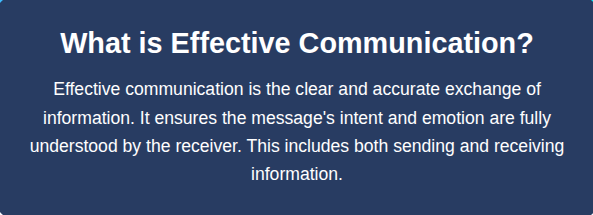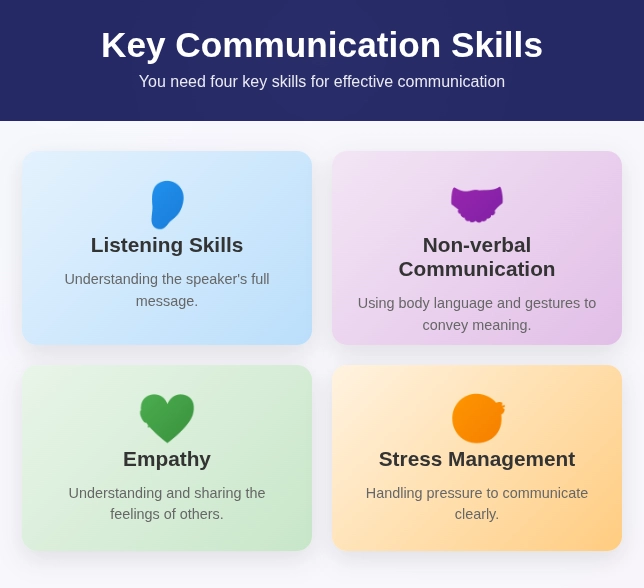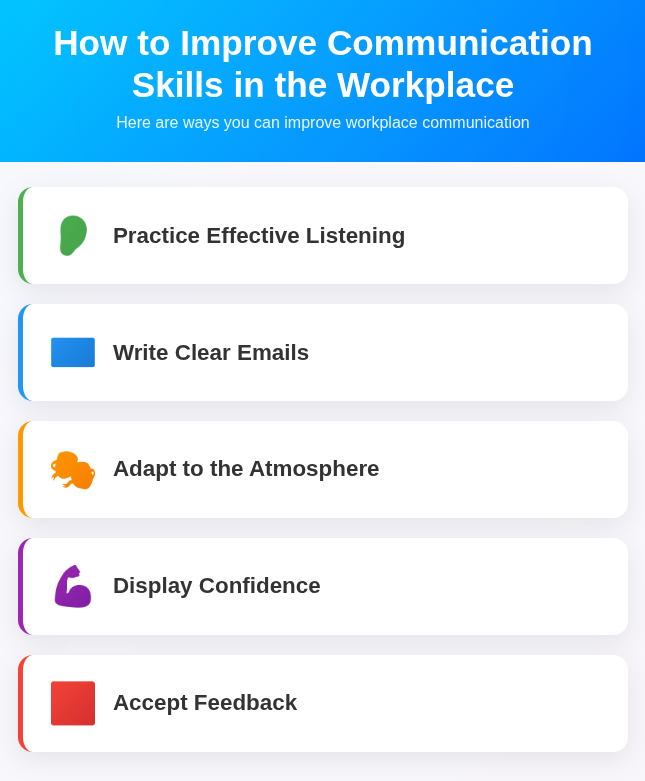What is Effective Communication?
Effective communication is the clear and accurate exchange of information. It ensures the message's intent and emotion are fully understood by the receiver. This includes both sending and receiving information.

Why Effective Communication is Important
Effective communication is crucial for your success. It reduces misunderstandings and conflicts. This builds stronger relationships and boosts productivity. Good communication also fosters team building and organizational growth. It helps create an environment where new ideas thrive and innovation happens. It also builds transparency and trust.
Free Online Communication Skills Course
Learn the essentials of effective communication. Master skills like email writing, report structuring, and tailor communication strategies to enhance your professional communication.
Key Communication Skills
You need four key skills for effective communication:
- Listening Skills: Understanding the speaker's full message.
- Non-verbal Communication: Using body language and gestures to convey meaning.
- Empathy: Understanding and sharing the feelings of others.
- Stress Management: Handling pressure to communicate clearly.

You want to improve your communication skills. This guide provides proven techniques to help you.
12 Ways to Improve Your Communication Skills
Here are 12 ways to improve your communication skills:
1. Practice Active Listening
You must listen to understand others. People often do not say exactly what they mean. Listen carefully and observe their body language. This helps you understand their true message. Make eye contact. This builds a positive connection. Avoid multitasking, overthinking, and using your phone. A good listener is a strong communicator.
Read More About Active Listening Here
2. Improve Non-Verbal Signals
Non-verbal communication holds significant power. It helps you keep your listener's attention. Research shows effective speeches are often 80% non-verbal. You can improve this by observing your own actions.
- Make eye contact. This shows engagement.
- Mind your posture. Stand or sit confidently.
- Use open gestures. Avoid crossed arms. This makes others comfortable.
- Watch your reactions. Notice how others respond to your body language.
- Avoid fidgeting. Stay in control of your movements.
Confidence supports strong non-verbal communication.
3. Enhance Verbal Communication
Avoid unnecessary pauses when you speak. These can feel awkward and give a bad impression. Organize your thoughts before you speak. This helps you relay information concisely. For spontaneous discussions, take a minute to prepare your thoughts. Use strong words to attract your listeners. Being tactful is also essential for good communication. You can phrase unpleasant facts well, and people will be more open to hearing them. Good communicators sense how someone will react.
Follow these points to improve your verbal communication:
- Vary your tone. A monotone voice can bore your audience. Use a wide range of rhythm, style, and speed.
- Speak clearly. Avoid a lower pitch that makes listening difficult.
- Use pauses effectively. Pause to grab attention before dropping your pitch. This creates suspense.
- Speak from your diaphragm. This helps lower your voice and adds authority.
Free Spoken English Course for Beginners
Elevate your conversations with our free spoken english course – Enhance pronunciation, expand vocabulary, and master professional communication & jargon!
4. Understand Your Audience
Knowing your audience is crucial for strong communication. You interact differently with your supervisor than with your children. Use the right communication style for each audience. For example, avoid casual language with your boss. Every listener has a limited attention span. A good communicator engages their audience. Ask questions during your session. Let others share their thoughts. This keeps attention and makes discussions more interesting.
5. Master Timing and Avoid Over-Communication
Speakers often overestimate how much listeners understand. A 1990 Stanford University study, "the tappers and the listeners," proved this. Tappers tapped 120 famous melodies. Listeners tried to identify the songs. Tappers estimated listeners would get 50% right. Listeners only identified 2.5% correctly. This shows your audience may not absorb as much as you expect. You must communicate with more clarity and illustrations.
A good communicator senses when to repeat an idea or move to a new topic. Great comedians, for example, master timing. They navigate non-scripted scenarios during live shows. This makes them highly effective communicators.
6. Use the PIP Approach
The PIP approach is a common framework business experts use for speeches. It stands for Preview, Importance, and Points.
- Preview: State the purpose of your introduction.
- Importance: Explain why your topic matters by discussing possible outcomes.
- Points: Outline the key points you will cover.
This approach helps you attract and hold your audience's attention.
7. Improve Visual Communication
Visual communication helps clarify your message. Think about serving food: if dishes are cluttered, it looks messy. If arranged clearly, it's appealing. Similarly, manage your spoken words well. Your message should be clear and well-organized. This helps retain listeners' focus. It also shares your message directly with your audience.
8. Mind Your Body Language
Body language is important for face-to-face meetings and video calls. Make yourself appear accessible. Use open body language; do not cross your arms. Maintain eye contact. This shows the other person you are paying attention.
9. Write Things Down
Take notes when talking to someone or in a meeting. Do not rely solely on your memory. This ensures accuracy and helps you recall important details.
Read: The Importance of Written Communication Skills
10. Think Before You Speak
Take a moment to process your thoughts. Pay close attention to what you plan to say. This helps you communicate clearly and avoid mistakes.
11. Treat Everyone Equally
Do not talk down to anyone. Treat everyone with respect. Address others as your equal. This builds trust and positive relationships.
12. Ask for Feedback
Ask colleagues for honest feedback on your communication skills. There is no harm in this. Cultivate a willingness to accept criticism. This helps you improve and build better relationships with coworkers.
Why Good Communication is Important at Work
Communication at work builds strong relationships. It helps you work productively. It also reduces errors. A survey found communication barriers cost an estimated $37 billion annually in lost productivity. You must practice good communication habits at work. It creates a shared understanding. Poor communication can lead to lost time and resources.
How to Improve Communication Skills in the Workplace

Here are ways you can improve workplace communication:
- Practice Effective Listening: You must listen carefully in a workplace. This helps you understand colleagues or team leaders. It boosts efficiency and prevents mistakes.
- Write Clear Emails: Most workplace communication happens via email. Ensure your emails convey a clear message.
- Adapt to the Atmosphere: Adjust to your workplace environment. Being comfortable with peers helps you convey thoughts effectively. Practice adaptive communication; avoid being overly formal in casual settings.
- Display Confidence: Your peers respond positively to confident communication. Building confidence takes practice. Focus on your purpose, believe in yourself, accept compliments, motivate others, and take constructive criticism.
- Accept Feedback: Positively accepting feedback improves workplace communication. It helps you grow and increases productivity.
Bonus Tip: Boost Your Public Speaking
Many people find public speaking difficult, even if they speak well alone. You can overcome this. Follow the 21-day rule: Dedicate one hour daily to improve your communication skills.
During this hour, stand in front of a mirror. Practice speaking as if an audience is present. Record short videos of yourself speaking with your phone camera. Watch these videos. This helps you understand your tone and learn more about yourself. You now have answers to how to improve your communication skills. Practice helps you master them.
Suggested Read:





